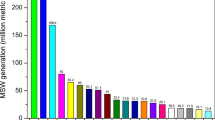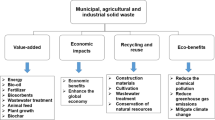Abstract
Toward diversifying the sources of electricity and ensuring the sustainability of power generation, the Kingdom of Saudi Arabia (KSA) is proposing an impressive plan for renewable energy utilization including waste-to-energy (WTE) facilities. The environmental values of WTE facilities in KSA have never been investigated. This research forecasted the potential environmental values of WTE facilities in KSA in the context of energy demand, greenhouse gas emission, and landfill area in comparison with complete landfilling option up to year 2032. Two scenarios were developed: Mass Burn with Recycling and Mass Burn. The research results have shown magnificent environmental values for WTE facilities. The Mass Burn with Recycling scenario shows potential energy demand reduction of about 55.6 million barrels of crude oil, greenhouse gas emission reduction of about 15.2 million metric ton carbon equivalent per year (MTCE/year), and landfill area saving of about 95.3 % in comparison with complete landfilling. Mass Burn scenario shows potential energy demand reduction of about 9.9 million barrels of crude oil, greenhouse gas emission reductions of about 4.8 million MTCE/year, and landfill area saving of about 90 % in comparison with landfilling. This research results shall support Saudi officials’ decision to develop WTE facilities in the Kingdom.

Similar content being viewed by others
References
Ouda O.K.M., Cekirge H.M., Raza S.A.: An assessment of the potential contribution from waste-to-energy facilities to electricity demand in Saudi Arabia. Energy Convers. Manag. 75, 402–406 (2013)
Ouda O.K.M., Shawesh A., Al-Olabi T., Younes F., Al-Waked R.: Review of domestic water conservation practices in Saudi Arabia. Appl. Water Sci. 3, 689–699 (2013)
CDSI: Population & Housing Census for 1431 A.H (2010 A.D) Findings. Central Department of Statistics & Information. http://www.cdsi.gov.sa. Accessed 10 October 2012 (2010)
Khan H.U., Hussain T., Khan S.M.: Solid waste management practices in the eastern provinces of Saudi Arabia. Environ. Manag. 11(2), 729–734 (1987)
Al-Ghusain J.M.I., Al-Hasawi H.: Management of recycling in the gulf co-operation council states. Waste Manag. 24, 551–562 (2004)
Gharaibeh E.S., Haimour N.M., Akash B.A.: Evaluation of current municipal solid waste practice and management for Al-Ahsa, Saudi Arabia. Int. J. Sustain. Water Environ. Syst. 29, 103–110 (2011)
MEP (2010) The Nine Development Plan 2010–2014. Ministry of Economy and Planning Documents. Riyadh, KSA
KACARE (2012) Renewable Energy–Waste to Energy, A pillar of the sustainable energy kingdom. First International Environment Conference. King Fahd Civic Centre, Yanbu Al Sinaiyah, KSA
Royal Decree: Royal Decree establishing King Abdullah City for Atomic and Renewable. No. A 35, 17 April 2010, Available online at:http://www.energy.gov.sa/_pdf/KACARE%20Royal%20Decree%20english.pdf Accessed 10August 2013 (2010)
Gipe, P.: Saudi Arabia Launches Massive Renewable Program with Hybrid FITs. News article published at Renewable Energy website. (2010). Available online at http://www.renewableenergyworld.com/rea/news/article/2012/05/saudi-arabia-launchesmassive-renewable-program-with-hybrid-fits Accessed 29 August 2013
AFED: Waste Management. Arab Forum for Environment & Development, Arab Environment: Future Challenge Report. ISBN:9953-437-24-6 (2008)
US. EPA: Solid Waste Management and Greenhouse Gases, A life-Cycle Assessment of Emission and Sinks. 3rd ed., Washington, US (2006)
Gilbert, M.M.; Wendell P.E.: Solid Waste Management and Resource Recovery. Introduction to Environmental Engineering and Science. 3rd, Pearson Education Inc. (2008) ISBN-13: 978-0-13-233934-6
Young, G.C.: Municipal Solid Waste to Energy Conversion Processes: Economic, Technical, and Renewable Comparisons, 1st ed., Wiley, Hoboken, New Jersey, US (2010)
Rogoff F., Screve M.J.: Waste to Energy. Elsevier, New York (2011)
Al Ansari, M.S.: Improving solid waste management in gulf co-operation council states: developing integrated plans to achieve reduction in greenhouse gases. Modern Appl. Sci. 6(2) (2012). doi:10.5539/mas.v6n6p60
Psomopoulos C.S., Bourka A., Themelis N.J.: Waste-to-energy: a review of the status and benefits in USA. Waste Manag. 29, 1718–1724 (2009)
Abdul Razak H., Naganathan S., Abdul Hamid S.N.: Controlled Low-Strenght Material Using Industrial Waste Incinerated Bottom Ash and Refined Kaolin. Arab. J. Sci. Eng. 35(2B), 53–67 (2010)
Ouda O.K.M.: Assessment of the environmental values of waste-to-energy in the Gaza strip. Current World Environ. 8(3), 364–455 (2013)
Author information
Authors and Affiliations
Corresponding author
Rights and permissions
About this article
Cite this article
Ouda, O.K.M., Cekirge, H.M. Potential Environmental Values of Waste-to-Energy Facilities in Saudi Arabia. Arab J Sci Eng 39, 7525–7533 (2014). https://doi.org/10.1007/s13369-014-1311-4
Received:
Accepted:
Published:
Issue Date:
DOI: https://doi.org/10.1007/s13369-014-1311-4




